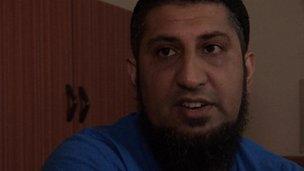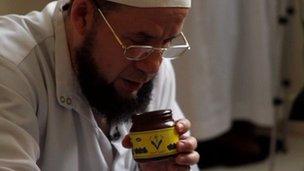Possession, Jinn and Britain's backstreet exorcists
- Published
Catrin Nye watches Mudasar Khan have an "exorcism"
UK health and social workers and those in the criminal justice system are increasingly having to understand belief in spiritual possession among ethnic minorities, with new research highlighting a particular issue with some sections of the British Asian community blaming mental health problems on the supernatural.
The exorcist Abou Mohammed sits cross-legged on the floor of a back-room in his home in Ilford, East London. He is surrounded by copies of the Koran, containers of olive oil and a spray-bottle of water which he uses on the Jinn, the supernatural spirits, that he says possess many of his clients.

Mudasar Khan says that exorcism has helped him where medication failed
Mr Mohammed, who goes by the title of Raqi, has a waiting list several months long and charges £60 for a one-hour session.
One of his clients is Mudasar Khan, 41, who says he has been possessed by a Jinn for years. He describes it as something that surrounds his body, buzzing, making him unwell and even stopping him sleeping.
Mr Khan has been on anti-depressants in the past and suffered panic attacks, but he says the Jinn prevented medication from working and that it is only coming to Abou Mohammed that has provided some relief.
"I had to go to the doctors and the hospitals too, to prove it to my family, because if I didn't do that side of it as well they'd think it was in my head," he says.
For five years Mr Khan has been treated by Mr Mohammed, who he says summons up the Jinn inside of him and speaks to it directly, easing its effect.
'Power to cure'
Mr Mohammed knows what he does is controversial - while we are filming his work he also films us, concerned that we will distort what he does - and he says that there are many charlatans in his field.
The exorcist believes some illnesses are unnecessarily dealt with by doctors when they are actually spiritual problems. He even says some people have operations they do not need because the Jinn has tricked doctors.

Abou Mohamed believes that Jinn can trick doctors into carrying out unnecessary procedures
"I cure them by this book [the Koran]. You have to have a faith in it and it will work. So yes, anxiety, depression, heart problems, many, believe me, many problems get cured by this healing."
Despite this, Mr Mohammed admits he does have some clients come to him who are seriously ill and need medical attention, particularly those who are mentally unwell.
When 20-year-old Nadeem (whose name we have changed) became ill he and his family thought he had a spiritual problem, that he was also possessed by a Jinn:
"I was at home and I was with my family and their faces looked different to me, my senses changed as well," he recalls. "I tried to lie down to sleep, but too many things were going through my mind and I felt my head is getting narrowed getting tight. My thinking is big; I'm thinking a lot of things."
He says that in the night he went down stairs and told his father how he was feeling:
"My parents got worried, they said don't worry we'll call a certain guy and he'll sort it out... so they called a person who's got the power to control these things and take them out."
'Writhing on the floor'
Nadeem's parents took him to an exorcist for treatment:
"I was physically fidgeting and flinching all over the place. I was on the floor in my house and I was screaming and the Jinn was trying to come out of my mouth," he says.
Nadeem says he felt better for his treatment, but that he did not recover and was eventually taken to hospital. He is now diagnosed with schizophrenia and takes daily medication.
Cases like Nadeem's, in which his illness was instantly attributed to possession, are not entirely uncommon and are a cause for concern among mental health professionals.
Professor Swaran Singh, head of the Mental Health and Wellbeing division at Warwick Medical School, has just completed a five year study, funded by the Department of Health, into why patients from ethnic minority backgrounds were often reaching mental health services in a more severely ill state than the rest of the population.
"We found that in the very early stages when people have depression or anxiety, they seek help through their GP because it looks like a psychological problem. When they become seriously unwell, like when they develop delusions or start hearing voices, then the groups diverge.
"The Asian groups, particularly the British Pakistanis, then attribute their problem to a religious cause, for instance, possession by a Jinn. So they seek help through the Imams, through the mosque," he says.
Among British Asians the belief in evil spirits is not uncommon. It can be concepts like black magic or the evil eye, it can also be that the body can be possessed causing physical harm.
British Muslims in particular are brought up learning of the existence of Jinn in the Koran, though what the Jinn actually are is not universally agreed upon.
Source of blame
Prof Singh says that religious care can bring a great deal of comfort to patients, but it can create serious problems if it is the only help sought:
"An extreme example I can think of was this Sikh gentleman who became ill when he was 18, but the family sought help within the community faith group, and he didn't come for psychiatric attention for 13 years. By that time a lot of damage has been done from the untreated illness."
As well as the misdiagnosis of mental health problems there have been other extreme consequences to the attribution of possession. In September this year four members of the same family were found guilty of the murder of 21-year-old Naila Mumtaz in Birmingham.
Birmingham Crown Court was told that Mrs Mumtaz's in-laws, Zia Ul-Haq and Salma Aslam, who along with her husband Mohammed Mumtaz and brother-in-law Hammad Hassan were convicted of her killing, thought she was possessed by evil spirits.
The trial heard evidence that she was killed as family members attempted to drive out a harmful Jinn spirit.
Naila's brother Nasir Mehmood believes Jinn was used as a way of "explaining away" the death:
"The thinking behind her in-laws was that they would have the body released, take it back home to Pakistan, and say Jinn did it. Jinn killed her. There's no reason to explain anything further than that. People are very susceptible to believe that sort of stuff," he says.
Tony Medhi, a family friend who helped Mr Mehmood through the case, says he is very used to seeing spiritual possession used as a "catch all" for any problems in the British Pakistani community he grew up in:
"The Jinn concept is used to keep society in its place. If somebody isn't behaving correctly, maybe somebody's behaviour is very extreme, it could be due to some mental illness, or physical disability or something like that, people will turn around and say 'it's Jinn. Jinn has done this to her or him'."
'Operating in the shadows'
This has also been the experience of Yasmin Ishaq, a teacher from Rotherham who said she became a healer herself because she saw peoples' beliefs being exploited:
"If somebody was saying I was being abused, or I'm living in horrific conditions, they would automatically silence them by saying 'she's possessed'. I'm talking from personal experiences - family members, neighbours, community members - where women were beaten on the premise that they were possessed when really it was just violence against women."
"Here today, in 2012, we have men claiming in national newspapers that they can fix all your problems, that they can basically sort out every kind of problem for a price."
Nazir Afzal, the Chief Crown Prosecutor for the North-West of England, says that "problem" healers are something the police are getting intelligence on.

Naila Mumtaz was murdered by four members of her family
"We're becoming more aware of it. I'm actually very pleased we've been talking to lots of community groups who want to tackle this themselves," he says.
However, there is still a long way to go. In the Naila Mumtaz case it is thought that the "healer" was in the room when she died. That person, as has happened in other cases, has never been traced.
"They do operate in the shadows. They are protected by others within their communities, or within their faiths, or within their places of worship. They may leave the country. So it can be very difficult to track down the healers," Mr Afzal says.
"That said, the police are getting a lot more intelligence from within the community in the hope that we can identify these people before serious harm occurs."
This is an issue that is not going away. The spiritual care department at East London's Mental Health Trust, which covers what is now one of the most ethnically diverse parts of the UK, says that their services were established to serve a community where religion was dying out, but that now most of their patients value the spiritual as much as they do science.
Prof Singh argues that education is vital among communities so that these healers do not get in the way of medical care:
"For panic attacks and depression, the current treatment now is not medication, it's talking therapies, and in some cultures this means talking to a healer, so it may work."
"It becomes problematic when it becomes an alternative to medical care - so when instead of taking medication, they rely exclusively on religious ceremony or religious procedure. That's not going to treat the condition, so faith may offer comfort but it doesn't offer a cure for illness."
You can listen to Catrin Nye's full documentary Possession, Jinn and Britain's Backstreet Exorcists it will also be available online here.
Catrin Nye reports for BBC Newsnight on the phenomenon of British Asians blaming the supernatural for mental health problems